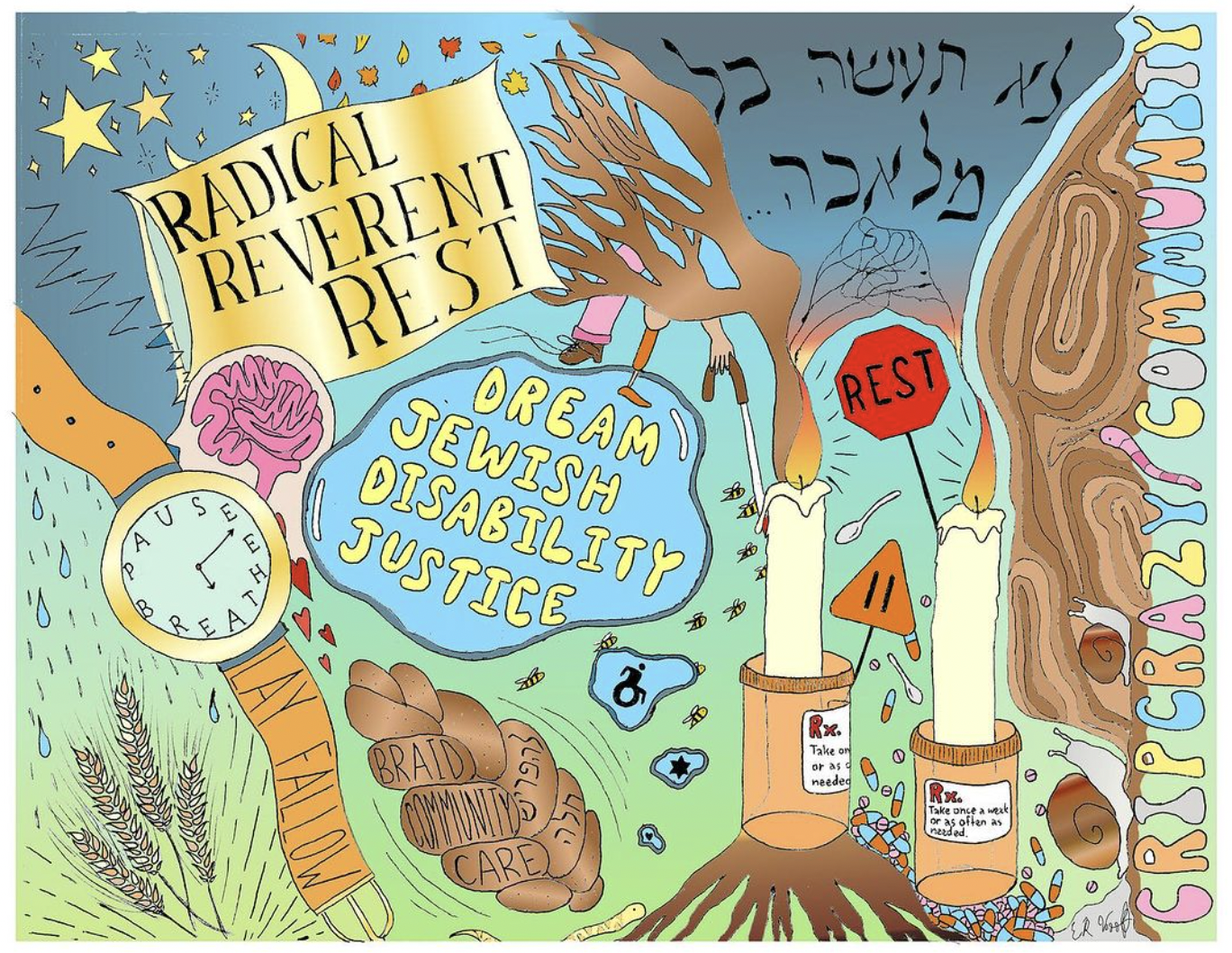Art by Emunah Woolf
This essay is part of Gufim: Our Jewish Bodies, a 2024 series by New Voices writers that explores embodiment, physicality, and our relationships to our bodies through a Jewish lens. Gufim focuses on disability & chronic illness, eating disorders and body liberation, queer/trans experiences, race/racism, and more. Our writers explore these issues through writing, art, and Torah. To submit to Gufim, please send your pitch or piece to editor@newvoices.org with the subject “Gufim Submission.”
I remember lighting Shabbat candles for the first time.
I sat on the floor, hunched over my family’s glass coffee table, as my mom looked on from the kitchen. We had found these little purple candle holders at a local café, paired with matching candles. I broke a few matches before finally managing to strike one. Holding it to the taper candles, flames melted the wax along with the week’s anxieties over classes. I flipped to the “Shabbat” section of my copy of Living a Jewish Life by Anita Diamant, and recited the blessing, trying to remember how my rabbi pronounced all the words. I felt like a child again, stepping into much larger footprints, cementing the path I was walking on the map of my life. My soul heaved a sigh of relief as I basked in the candles’ warm glow.
Shabbat was the first step of my journey into Jewish practice. It was certainly the most accessible, since this was during the COVID-19 pandemic and I could perform the rituals at home. Months later, I told the rabbis on my beit din council that Shabbat was my “first and favorite” Jewish ritual. I felt a particularly strong connection to the idea of intentional rest, especially after being diagnosed with a chronic illness. Jewish thought and practice provided a revolutionary new paradigm – it not only allowed for the practice of rest and recuperation but encouraged it, on both a physical and spiritual level.
My chronic illness is characterized by draining fatigue and chronic pain, which leave me unable to participate in public life to the extent to which I am expected. Before my diagnosis, I felt incredibly worthless – I couldn’t explain the sudden lack of energy for all of the activities I used to engage in with ease. I fell into depression and despair, and my first attempt at coping was to push myself even harder than before. This is the solution encouraged by a society that associates a person’s worth with their productivity, and their ability to function, work, and socialize in a way that is seen as “typical.”
The roots of this norm can be found in what sociologist Max Weber describes as the “Protestant Ethic.” During the Protestant Reformation, the idea that a productive life on Earth would lead to the promise of heaven gained prominence. This new ethical and religious framework saw hard work and self-denial as the path to salvation. Financial success garnered from “noble” labor was no longer a mark of greed; rather, it signified religious favor. During the Industrial Revolution, Protestant Christians were encouraged to engage with the secular economy and adapt to industrial capitalism, which measured each worker’s value as a productive unit. The Protestant Ethic has left an indelible imprint on American society, now divorced from its original religious context. It informs the popular notion that anyone can succeed if they simply try hard enough, and that a lack of success is, therefore, the fault of the individual.
As a student of sociology, I understood the flaws in this hyper-individualistic framework. However, I still found it difficult to detach myself from it. These ideas had influenced my parents’ upbringing, and therefore my own. They crushed me under a mountain of guilt from which it felt impossible to escape. I realized that the comfort I needed was not going to come from my studies or the validation of a medical diagnosis.
I had been interested in Judaism long before the pandemic, and was just beginning to discover that my family had a Jewish background. I had made some close Jewish friends online during the pandemic, and learned much from them about the expansiveness and diversity of Jewish philosophy and theology. I was captivated by the idea of pikuach nefesh: the idea that the preservation of one’s life and health takes paramount importance when considering the ability to participate in Jewish rituals (such as fasting). That idea made perfect sense to me, but seemed revolutionary in the context of a larger society in which health and wellbeing are not prioritized.
As I learned more about Judaism, I marveled at how many of its core tenets aligned with my personal philosophy. I began to set aside time during Shabbat to take care of my chronically ill body, and for the first time, I did not feel hounded by guilt over that decision. Reorienting my life around Shabbat led me to plan my days with intention, allowing for all the rest I needed. I went back to school with a lighter class load and scheduled rest days in between class days, which helped me to rebuild my academic confidence. I reordered my priorities, telling myself: my health is most important, and if I feel unable to attend class, I am allowed to stay home and take care of myself. Shabbat continues to serve as a grounding reminder that rest is sacred. I am still working on being at peace with my unique position in the tapestry of the universe, but Judaism has been a guiding light towards understanding myself as a valuable part of this world, just as I am.
While there is growing dialogue around the importance of “self-care,” people are still shamed and punished for devoting time to the practice of rest, recovery, and care for the body and mind. But I have seen Jewish wisdom anchor chronically ill and disabled people amidst a society that is built, in many ways, to exclude us. It can also provide a lens through which our abled community members can better understand our struggles and perspectives, as well as discover the healing potential of intentional rest in their own lives. Rabbi Elliot Kukla, a chronically ill rabbi at the forefront of the conversation of the value of rest, believes that “taking the present moment slowly and gently… napping, dreaming, nurturing relationships and loving fiercely” could benefit everyone living under the never-ending pressure to work harder and move faster.
Shabbat can be difficult to keep under financial and social pressures that demand increasing amounts of our waking lives. The current reality of society and its inequities means that not everyone is able to carve out deliberate rest time of their own accord. It is up to us to encourage those who have control over the structures of others’ lives to build in this time. Tricia Hersey, creator of the blog “The Nap Ministry,” describes rest as beyond naps and pillows – it is “a deep unraveling from white supremacy and capitalism.” Part of this unraveling is recognizing that when poor, Black, brown, disabled, and otherwise marginalized people work to their breaking points and are forced to rest, they are considered lazy. But, as Rabbi Kukla points out, “we rarely hear about lazy billionaires, no matter how much of their fortune is inherited.” Recognizing the inequity associated with rest involves challenging the capitalist system of exploitation as a whole. Adopting the radical politics of rest is a form of tikkun olam – repairing our world necessitates challenging the status quo. It is important to use our privilege where we have it to make rest more accessible for everyone.
I work toward a time when the needs of chronically ill and all disabled people are respected and their unique contributions and perspectives are appreciated. I work toward a time when fewer people feel overcome by the guilt associated with taking the necessary time to recover. I work toward a time when our worth is not defined by our productivity. Judaism opened the door for a new way of thinking about rest, and I am dedicated to helping others walk through it. Every week, I remind myself in the candlelight: This time is for you. You did not have to earn it. You are beyond enough – as you are.

